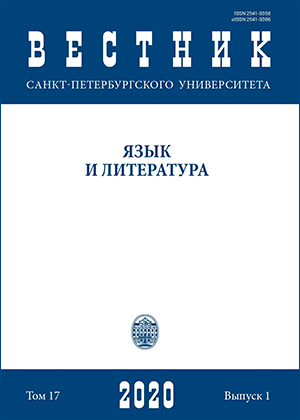Locus branding as a reflection of the geocultural space characteristics (the linguistic and cognitive aspect)
DOI:
https://doi.org/10.21638/spbu09.2020.102Abstract
The article is devoted to the process of locus branding aimed at establishing a geocultural brand on the basis of realizing several discourse practices dependent on the sender’s goals and the recipient’s attitude. The ontological status of the phenomenon under consideration postulates the interdisciplinary nature of the investigation. The author defines locus brand as a cognitive phenomenon. Special attention is paid to the emotional connection between the locus brand and its recipient. Hence, emotional brand characteristics are identified. The article considers such notions as the locus brand mental field, its dimensions as well as the locus brand code, which is viewed as a mechanism responsible for mental worlds forming in the recipient’s mental space. It is shown that locus branding involves a number of discourse practices, such as objective data involvement, detailed elaboration and specification of geocultural information, and locus brand creation via a legend or a tale, the genius loci. The article contains a detailed analysis of the above practices. The author demonstrates the possibilities of the combined approach used to create the integrated locus brand model which apart from the geographical component includes linguistic and cultural ones. The role of the interaction between the verbal and visual components used to create a full-fledged territorial image is emphasized. Using polymodal sources ensures better memorization of the referent’s image and facilitates the creation of the recipient’s situational model correlating with the locus-brand’s major characteristics.
Keywords:
locus branding, geocultural image, discourse practice, recipient, situational model
Downloads
References
Гобэ 2014 — Гобэ М. Присутствие бренда: отличие от повсеместности и эмоциональная атмосфера. В кн.: Гобэ М. Эмоциональный брэндинг: новая парадигма, соединяющая брэнды с людьми. Пер. с англ. П.Миронова. СПб.: BestBusinessBooks, 2014. https://www.marketing.spb.ru/lib-comm/brand/EB.htm (дата обращения: 31.01.2019).
Гэд 2005 — Гэд Т. 4D брэндинг: Взламывая корпоративный код сетевой экономики. Пер. с англ. М.Аккая. Сер.: Книги Стокгольмской школы экономики в Санкт-Петербурге. 3-е изд. СПб.: Стокгольмская школа экономики в Санкт-Петербурге, 2005. 228 с.
Долан 2012 — Долан Р. Эмоции, познание и поведение. В кн.: Горизонты когнитивной психологии: хрестоматия. Спиридонова В.Ф., Филикман М.В. (ред.). Сер.: Разумное поведение и язык. Language and Reasoning. М.: Языки славянских культур; Российский государственный гуманитарный университет, 2012. С. 231–241.
Ильин 2001 — Ильин Е.П. Эмоции и чувства. СПб.: Питер, 2001. 752 с.
Карлёф 2006 — Карлёф Б., Лёвингссон Ф.Х. Менеджмент от А до Я: концепции и модели. Пер. с англ. Е.Карповой, П.Миронова. Сер.: Книги Стокгольмской школы экономики в Санкт-Петербурге. СПб.: Стокгольмская школа экономики в Санкт-Петербурге, 2006. 441 с.
Куликова 2012 — Куликова О.В. Прагматика бизнес-коммуникации в среде Интернет. Вестник Московского государственного лингвистического университета. 2012, (647): 108–128.
Куликова 2013 — Куликова О.В. Типологические характеристики современного туристического дискурса. В кн.: Экономика языка и бизнес — 2: Туризм: сборник научных трудов по материалам Международного семинара, Москва, 25 октября 2013 г. М.: Моск. гос. лингвист. ун-т, 2013. С. 45–51.
Левинтов 2013 — Левинтов А.Е. Гений места, совесть места, проклятые места. Лабиринт: Журнал социально-гуманитарных исследований. 2013, (3): 88–96. https://journal-labirint.com/wp-content/uploads/2013/07/levintov.pdf (дата обращения: 22.03.2019).
Oswald 2012 — Oswald L.R. Marketing semiotics: Signs, strategies and brand value. Oxford: Oxford University Press, 2012. 218 p.
References
Гобэ 2014 — Gobé M. Brand presence: difference from ubiquity and emotional atmosphere. In: Gobé M. Emotsional’nyi brending: novaia paradigma, soediniaiushchaia brendy s liud’mi. Transl. from English by P.Mironov. St. Petersburg: BestBusinessBooks Publ., 2014. https://www.marketing.spb.ru/lib-comm/ brand/EB.htm (access date: 31.01.2019). (In Russian)
Гэд 2005 — Ged T. 4D Branding: Cracking the corporate code of the network economy. Transl. from English by M.Akkaia. Ser.: Knigi Stokgol’mskoi shkoly ekonomiki v Sankt-Peterburge. 3rd ed. St. Petersburg: Stockholm School of Economics in St. Petersburg Publ., 2005. 228 p. (In Russian)
Долан 2012 — Dolan R. Emotion, cognition and behavior. In: Gorizonty kognitivnoi psikhologii: khrestomatiia. Spiridonova V.F., Filikman M.V. (eds.). Moscow: Iazyki slavianskikh kul’tur Publ.; Russian State University for the Humanities Publ., 2012. P. 231–241. (In Russian)
Ильин 2001 — Il’in E.P. Emotions and feelings. St. Petersburg: Piter Publ., 2001. 752 p. (In Russian)
Карлёф 2006 — Karlöf B., Lövingsson F.H. The A–Z of management: concepts and models. Transl. from English by E.Karpova, P.Mironova. Ser.: Knigi Stokgol’mskoi shkoly ekonomiki v Sankt-Peterburge. St. Petersburg: Stockholm School of Economics in St. Petersburg Publ., 2006. 441 p. (In Russian)
Куликова 2012 — Kulikova O.V. Pragmatics of business communication in the Internet. Vestnik Moskovskogo gosudarstvennogo lingvisticheskogo universiteta. 2012, (647): 108–128. (In Russian)
Куликова 2013 — Kulikova O.V. Typological characteristics of modern tourist discourse. In: Ekonomika iazyka i biznes — 2: Turizm: sbornik nauchnykh trudov po materialam Mezhdunarodnogo seminara, Moskva, 25 okniabria 2013 g. Moscow: Moscow State Linguistic University Publ., 2013. P. 45–51. (In Russian)
Левинтов 2013 — Levintov A.E. Genius loci, conscience of the place, cursed places. Labirint: Zhurnal sotcial’no-gumanitarnykh issledovanii. 2013, (3): 88–96. https://journal-labirint.com/wp-content/uploads/2013/07/levintov.pdf (access date: 22.03.2019). (In Russian)
Oswald 2012 — Oswald L.R. Marketing semiotics: Signs, strategies and brand value. Oxford: Oxford University Press, 2012. 218 p.
Downloads
Published
How to Cite
Issue
Section
License
Articles of "Vestnik of Saint Petersburg University. Language and Literature" are open access distributed under the terms of the License Agreement with Saint Petersburg State University, which permits to the authors unrestricted distribution and self-archiving free of charge.






